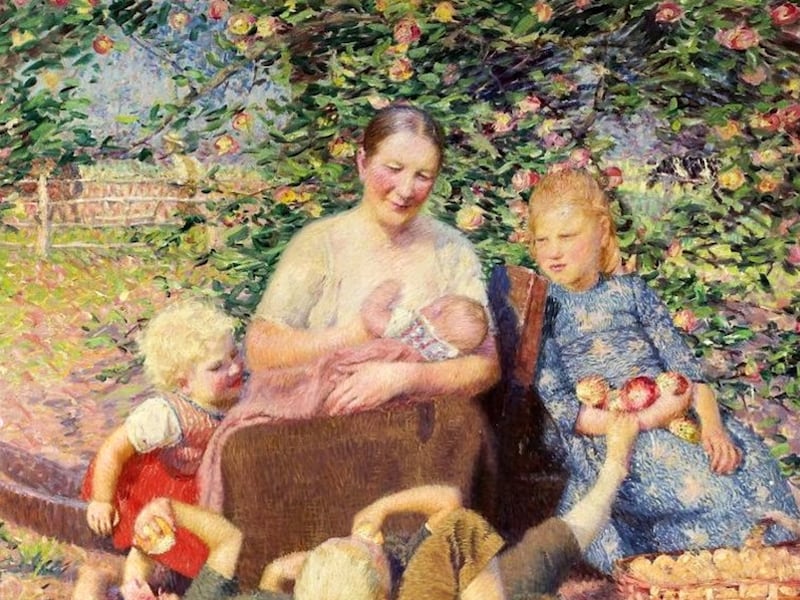When I was 22 and in my first job after college, one of my colleagues would openly share her fertility struggles at the lunch table. She was in her early 40s and would talk about what she and her husband were trying to do to get pregnant with a third child. She wished they had started a family when they were first married rather than having waited a few years.
I would refer to her story when I started my pressure campaign with my husband to start our own family a few years later. He argued it didn’t make sense for us to have a baby then. We were broke and none of our friends of a similar age were having babies. We couldn’t afford it in so many ways — not just financially, but also professionally.
To combat my husband’s arguments, I utilized two talking points: What if we run into fertility problems? What if we end up wanting more kids than we originally thought (like my co-worker did) but run out of time?
That first argument was what did the trick; we had our first child when I was 27. The second argument, on the other hand, fell flat: He scoffed at the notion we’d want more than three or four kids, max. As I sit here writing this on my phone in the dark while nursing our fifth, I’ll hold my “I told you so” inside.
I have thought about this lately, because of women who are writing cautionary tales about waiting too long to have children.
Recently a friend of mine, who writes under the pseudonym Bridget Phetasy, penned a moving piece about her miracle pregnancy at 42 years old. She wrote about having been told she was already in menopause:
The doctor was so casual about it, too. Like she was telling me they were out of soy milk at Starbucks. A minor inconvenience, but nothing life-altering. My emotions were all over the place. (I assumed it was the menopause, of course.) I called my friend, sobbing.
“I don’t even know why I’m crying,” I said through tears. “I didn’t think I wanted kids. And now I can’t tell if I’m sad because it’s not an option or if I always wanted kids and couldn’t admit it to myself.”
In her column, Phetasy said she’d spent her 20s in a “kind of anti-natalist nihilism that is so fashionable these days.” She expressed her regret about not freezing her eggs.
But in 2018, The Washington Post profiled the woman who was seen as the poster child for the procedure, Brigitte Adams, who appeared on the cover of Bloomberg Businessweek under the headline, “Freeze your eggs, Free your career.”
“Adams remembers feeling a wonderful sense of freedom after she froze her eggs in her late 30s, despite the $19,000 cost. Her plan was to work a few more years, find a great guy to marry and still have a house full of her own children,” Ariana Eunjung Cha wrote. “Things didn’t turn out the way she hoped.”
When Adams began trying to have a child at the age of 44, all her attempts failed. When she found out the final fertilized egg that had been implanted in her uterus wasn’t viable, she said she screamed “like a wild animal” and collapsed. The profile showed with haunting clarity how much having a child can mean to a woman — and the pain of not being able to be a mother.
Unfortunately, egg freezing isn’t a scientific miracle that guarantees women more fertile years. In 2019, NBC News ran a story on the realities of egg freezing. They reported on the physical, financial and emotional toll the procedure takes, citing statistics with his success rates as low as 11%.
NBC quoted Tanya Selvaratnam, an activist and author of “The Big Lie: Motherhood, Feminism, and the Reality of the Biological Clock, who explained, “One of the fantasies is that when a woman is ready to have a child, that science will make it possible for them.”
Phetasy isn’t the only one talking about fertility and age recently. Danae Mercer recently went viral on Instagram sharing her journey and sense of regret.
In the pages of Hollywood gossip magazines, we often see stars having children into their 40s, with little explanation of the technology and sacrifice used to achieve it. Women like my former colleague, Phetasy and Mercer are doing an incredible public service, being open about the realities of the biological clock and their sense of regret about trying to ignore its urgent ticking.
My colleague’s honesty directly changed the lives of everyone in my family, and I’m thankful she opened my eyes and got me thinking about my own fertility long before I would have otherwise. Those were precious years that meant more babies in our home, the biggest blessing of our lives.
Bethany Mandel is a contributing writer for the Deseret News and an editor of the children’s book series “Heroes of Liberty.”


